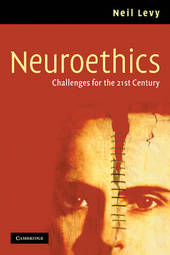
|
Neuroethics: Challenges for the 21st Century
Paperback / softback
Main Details
| Title |
Neuroethics: Challenges for the 21st Century
|
| Authors and Contributors |
By (author) Neil Levy
|
| Physical Properties |
| Format:Paperback / softback | | Pages:364 | | Dimensions(mm): Height 229,Width 152 |
|
| Category/Genre | Bio-ethics
Neurosciences |
|---|
| ISBN/Barcode |
9780521687263
|
| Classifications | Dewey:174.2928 174.2928 |
|---|
| Audience | | Professional & Vocational | |
|---|
| Illustrations |
Worked examples or Exercises
|
|
Publishing Details |
| Publisher |
Cambridge University Press
|
| Imprint |
Cambridge University Press
|
| Publication Date |
12 July 2007 |
| Publication Country |
United Kingdom
|
Description
Neuroscience has dramatically increased understanding of how mental states and processes are realized by the brain, thus opening doors for treating the multitude of ways in which minds become dysfunctional. This book explores questions such as when is it permissible to alter a person's memories, influence personality traits or read minds? What can neuroscience tell us about free will, self-control, self-deception and the foundations of morality? The view of neuroethics offered here argues that many of our new powers to read ,alter and control minds are not entirely unparalleled with older ones. They have, however, expanded to include almost all our social, political and ethical decisions. Written primarily for graduate students, this book will appeal to anyone with an interest in the more philosophical and ethical aspects of the neurosciences.
Author Biography
Neil Levy is a Senior Research Fellow at the Centre for Applied Philosophy and Public Ethics, University of Melbourne, Australia, and a Research Fellow at the Program on the Ethics of the New Biosciences, Oxford. He has published more than fifty articles in refereed journals, as well as four books previous to this one.
Reviews'Neil Levy's book is an important contribution to the developing field of neuroethics. His mastery of a breadth of disciplines from neuroscience and cognitive psychology to moral philosophy is impressive. This book will be a valuable guide to any reader wishing to think seriously about the relationship between neuroscientific knowledge and our understanding of moral judgement, personal responsibility, and the philosophy of mind and brain.' Richard Ashcroft, Professor of Biomedical Ethics, Queen Mary, University of London
|